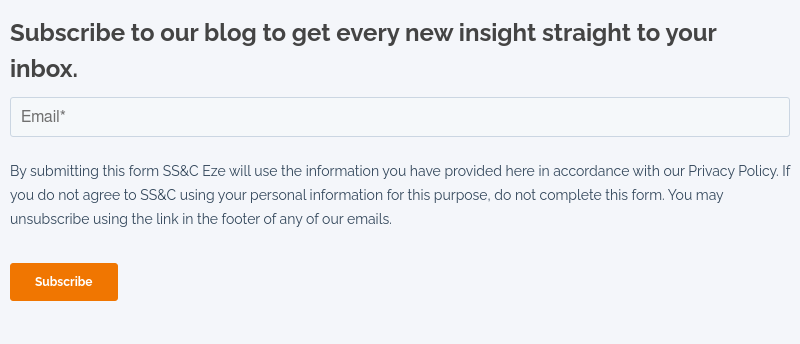Emerging firms have a unique opportunity to outpace established competitors by prioritizing back-office technology up-front.
Emerging alternative fund management firms face tough competition from established players. However, new businesses have a key advantage: they're not stuck with outdated systems. While larger firms struggle with legacy technology, startups can build their operations from the ground up.
This strategic advantage is often overlooked as new firms prioritize flashy front-office tools for trading, portfolio management, and compliance and neglect laying critical groundwork in the back office.
These firms often assume tracking investments with spreadsheets or limited accounting and reporting software to keep overhead down isn’t a problem because they can always add additional solutions as they grow.
While it is true that there are many valuable back-office tools on the market that can be added to an existing investment infrastructure, a patchwork of disparate systems cobbled together as the business grows can lead to operational inefficiencies, data inconsistencies, and increased operating expenses—the very thing the firm was trying to avoid.
Firms can bypass this operational roadblock and future-proof their technology investment by making critical back-office considerations from the start. Investing in a solid back-office foundation early on allows emerging firms to streamline operations, reduce errors, and gain a competitive edge.
This blog will guide you through essential back-office considerations to help you avoid common operational pitfalls, gain competitive footing in the industry, and build a scalable platform for long-term growth.

Back-office Considerations for Emerging Fund Managers
At a minimum, emerging managers should prioritize laying an operational foundation for fund accounting and reporting, investor accounting and servicing, and operations.
Fund accounting and reporting: This component should support complex fund strategies and structures, provide a centralized book of record, and enable timely and accurate NAV calculations.
Investor accounting and servicing: This tool should accurately allocate profits and losses among investors and calculate fees.
Operations: Your operations solution should streamline back-office processes by automating connectivity with custodians and prime brokers, enabling efficient daily reconciliations.
Ideally, each of these tools should connect seamlessly with the firm’s front- and middle-office operations. The easiest way to ensure these systems connect is to choose a single vendor with which to build your investment ecosystem.
Accounting Precision, Laying the Groundwork for Future Fund Health
Precision is paramount in fund accounting. Every transaction, every fee, every holding – it all contributes to the overall health of your fund. That’s why selecting the right end-to-end provider is crucial. Let’s dig deeper into the accounting capabilities to be on the lookout for as you make your back-office considerations.
Flexible journal entries: The ability to debit or credit non-trading financial accounts directly within the general ledger and to settle all outstanding payable accounts to cash at month end with a single entry.
Simple onboarding: Easily import free receipts, delivers, and historical P&L/ROR for historical transparency and seamless setup.
Trial balance transparency: Drill into owners’ equity, assets, liabilities, income, and expenses for detailed analysis and reconciliation.
Multi-period reporting: View and analyze month, quarter, or year-to-date performance for any historical timeframe with a single report.
Granular NAV and P&L detail: Break down P&L into components like unrealized gains/losses, capital gains, dividends, stock loans, and other criteria for a complete picture of fund investments.
By choosing an end-to-end platform with these capabilities, you’ll not only be able to address everyday issues back-office teams encounter but also lay the groundwork for a healthy future for the fund.
Considerations for Managing Future Operational Complexity
Making the necessary back-office considerations as you’re starting out future-proofs your firm’s technology as it grows. To further invest in your firm’s future, familiarize yourself with your technology provider’s managed services offerings.
As operational complexity increases, more and more firms are turning to outsourced services to expand the footprint of their operations without increasing headcount.
With these services, you can tap into the expertise of operations specialists who have worked with dozens of other firms in the industry and can apply that experience to benefit your firm.
One key advantage of managed services is the agility it gives your firm as it changes and grows. Firms can scale up resources to meet market demands or support new strategies while allowing internal teams to focus on competitive differentiators, like investor relations and investment strategies.
By prioritizing back-office technology from the outset, emerging alternative fund managers not only lay a technical foundation for long-term success but gain a competitive advantage early on. While building a patchwork of systems might seem cost-effective in the short term, it can lead to significant challenges down the line. A robust foundation in operations, fund, and investor accounting is essential to scale efficiently and maintain accuracy.
By investing in a comprehensive, end-to-end solution, firms can streamline processes, mitigate risks, and gain a competitive edge. This strategic approach, coupled with the potential for managed services, empowers emerging managers to focus on growth and investment strategies while ensuring operational excellence today and in the future.
Learn how you can secure your firm’s future with a strong back office. Download our whitepaper, Patchwork Doesn’t Work Anymore: Moving Forward With a Streamlined Investment Platform.
Or learn about Eze Eclipse, a born-in-the-cloud solution focused on the needs of startup and emerging hedge funds looking to optimize operational efficiency and minimize total cost of ownership. Eclipse supports the full investment process within a single, unified platform accessible through a secure web browser interface. See Eclipse in action.

.webp?width=575&name=eze-banner-back-office-1920x440-240926%20(1).webp)
